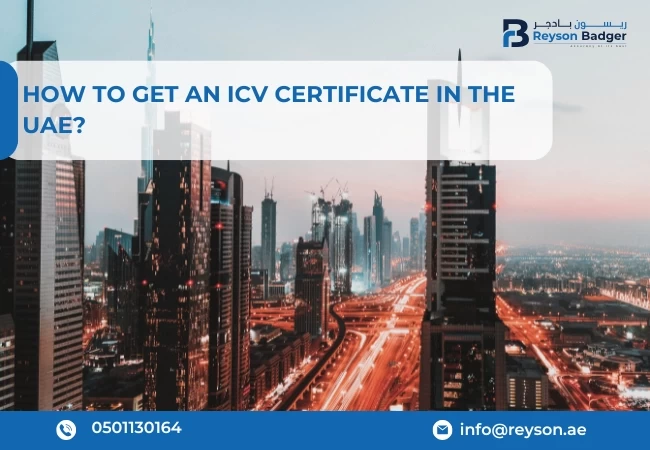How to Get an ICV Certificate in the UAE?
Written By Akshaya Ashok, Reviewed By Nouphal P C
Published on 14/02/2025

In the United Arab Emirates (UAE), the In-Country Value (ICV) certificate has emerged as a vital credential for businesses seeking to strengthen their local presence and capitalize on lucrative government contracts. Introduced by the UAE government to promote economic diversification and local content development, the ICV certificate is a critical requirement for companies aiming to participate in public procurement tenders. By obtaining an ICV certificate, businesses can demonstrate their commitment to supporting the UAE's economic growth and development, while also gaining a competitive edge in the market. In this blog, we will delve into the world of ICV certification, exploring its significance, benefits, and the step-by-step process of obtaining this essential credential for businesses operating in the UAE.
What is an ICV Certificate?
The In-Country Value (ICV) Certificate is an official document issued primarily in the UAE, certifying the level of local economic contribution made by a company. It was initially introduced by the Abu Dhabi National Oil Company (ADNOC) and is now managed by the Ministry of Industry and Advanced Technology (MOIAT). The certificate reflects a company's commitment to promoting local sourcing, investments, and employment, thereby enhancing the economic impact within the UAE.
Benefits of ICV Certificate for Businesses in UAE
Obtaining an ICV Certificate offers several advantages for businesses operating in the UAE:
- Competitive Advantage: Companies with an ICV Certificate are often given preference in government tenders and contracts, enhancing their chances of winning bids.
- Enhanced Reputation: The certification demonstrates a company's commitment to supporting the local economy, which can improve its reputation among stakeholders and clients.
- Access to Opportunities: Businesses that prioritize local content and Emiratization are more likely to attract foreign investment and partnerships.
- Increased Local Procurement: The ICV program incentivizes companies to source goods and services from local suppliers, fostering relationships within the UAE market.
- Support for Economic Diversification: By encouraging local investments and job creation, the ICV Certificate aligns with broader national goals for economic diversification and sustainable development.
How Does ICV Certificate Support UAE's Economic Development?
The ICV Certificate plays a significant role in supporting the UAE's economic development through various mechanisms:
- Boosting Local Industries: By promoting local sourcing and investments, the ICV program helps strengthen domestic industries, ensuring that more financial resources remain within the country.
- Job Creation: The certification encourages companies to hire and train UAE nationals, contributing to workforce development and reducing unemployment rates.
- Attracting Foreign Investment: Companies that demonstrate a commitment to local economic contributions are viewed as favorable partners for international investors, thereby attracting more foreign capital into the UAE.
- Sustainable Development Goals: The ICV program aligns with the UAE's vision for sustainable economic growth by fostering a diversified economy that relies on local capabilities and resources.
Eligibility Criteria for ICV Certificate
To be eligible for an ICV Certificate in the UAE, businesses must meet specific criteria established by the Ministry of Industry and Advanced Technology (MOIAT) and relevant certifying bodies.
Primary Requirements
- Registration: Companies must be registered with the appropriate government agency and possess a valid trade license.
- Physical Presence: Businesses must be physically located in the UAE and actively engaged in providing products or services.
- Industry-Specific Requirements: Each company must adhere to specific ICV requirements pertinent to its industry, which may include local content, workforce Emiratization, and contributions to regional infrastructure.
- Independent Audit: Companies are required to undergo an independent audit conducted by an authorized certifying body to evaluate their performance and calculate their ICV score.
How ICV Certification Benefits the UAE Economy and Businesses?
The ICV Certificate strengthens the UAE economy while helping businesses grow and stay competitive. Here’s how it benefits both the economy and businesses.
| ICV Certificate’s Impact on UAE’s Economy |
ICV Certificate’s Benefits for Businesses |
|
Encourages local sourcing and investment to strengthen domestic industries.
|
Helps businesses tap into new markets, contracts, and partnerships.
|
|
Promotes employment and training of UAE nationals.
|
Gives businesses a competitive advantage, helping them expand and grow.
|
|
Companies contributing to the local economy attract global investors.
|
Builds trust with international investors by demonstrating local economic commitment.
|
|
Align with the UAE’s vision for a self-sustaining, diversified economy.
|
Encourages investment in local talent, technology, and infrastructure.
|
|
Promotes supply chain optimization and reliance on local resources.
|
Helps businesses streamline procurement, reduce costs, and enhance performance.
|
Types of Businesses Eligible for ICV Certificate
The ICV Certificate is available to a wide range of businesses in the UAE, including:
- Manufacturing Companies: Firms involved in producing goods locally.
- Service Providers: Businesses offering various services within the UAE, such as consultancy, logistics, and maintenance.
- Construction Firms: Companies engaged in construction projects that contribute to local infrastructure.
- Suppliers: Entities supplying goods or services to government contracts or large organizations, particularly those exceeding AED 30 million in contract value.
Required Documents for ICV Certificate Application
To apply for an ICV Certificate, businesses must prepare and submit several key documents, including:
- Audited Financial Statements: These should comply with International Financial Reporting Standards (IFRS) and cover the last two financial years.
- ICV Template: A completed ICV application template that outlines the company's contributions to the local economy.
- Supporting Documentation: This includes records related to accounts payable, local procurement activities, and any other relevant financial information that supports the ICV score calculation.
- Trade License: A copy of the current trade license confirming the company's registration with the appropriate authorities.
Step-by-Step Process to Get ICV Certificate
Obtaining an ICV certificate involves a straightforward process. Here’s a step-by-step guide to walk you through the application process.
Step 1: Register on the ICV Portal
- Visit the ICV portal website.
- Choose "Register" and create your account.
- Fill out the registration form with your company's details.
- Submit the registration form.
Step 2: Fill Out the ICV Certificate Application Form
- Log into your ICV portal account.
- Click on "Apply for ICV Certificate."
- Fill out the ICV certificate application form with your company's details.
- Double-check that all details are correct and complete.
Step 3: Upload Required Documents
- Prepare the required documents, including:
- Audited financial statements.
- ICV template.
- Supporting documentation.
- Trade license.
- Upload the documents to the ICV portal.
Step 4: Pay the Application Fee
- Pay the ICV certificate application fee.
- Ensure the payment is successful.
Step 5: Wait for ICV Certificate Approval
- Wait for the ICV certificate application to be reviewed.
- Receive notification of approval or rejection.
- If approved, download the ICV certificate from the ICV portal.
Required Documents for ICV Certificate Application
To apply for an In-Country Value (ICV) Certificate in the UAE, businesses must submit a comprehensive set of documents. Below is a list of the required documents along with explanations of each document and its importance.
- Audited Financial Statements:
These are financial reports prepared by the International Financial Reporting Standards (IFRS) and audited by an independent certified public accountant.
A standardized form that businesses must complete to calculate their ICV score based on local contributions.
- Accounts Payable Records:
Documentation detailing payments made to suppliers and service providers, particularly those based in the UAE.
A copy of the current trade license that confirms the company's legal registration and ability to operate within its specified industry.
Details about employees, including numbers and roles, particularly focusing on Emiratization efforts (hiring UAE nationals).
Copies of significant contracts and invoices related to projects or services provided, especially those involving government contracts or local entities.
- Supporting Documentation:
Additional records may include project details, investment summaries, or any other relevant information that supports the application.
Conclusion
Getting an ICV certificate is important for businesses in the UAE. It shows that they care about the local economy and follow the rules. Reyson Badger, an expert in UAE business laws, says, ICV certification is now a must for businesses that want to be taken seriously in the UAE. So, if a business wants to grow in the UAE, getting this certificate should be a top priority. With an ICV certificate, they can get more government contracts, build a better reputation, and become more competitive.

Written By
Akshaya Ashok
Akshaya Ashok is a content writer specializing in creating content focused on accounting and auditing. With over two years of experience, she has developed expertise in crafting professional content for the financial sector.

